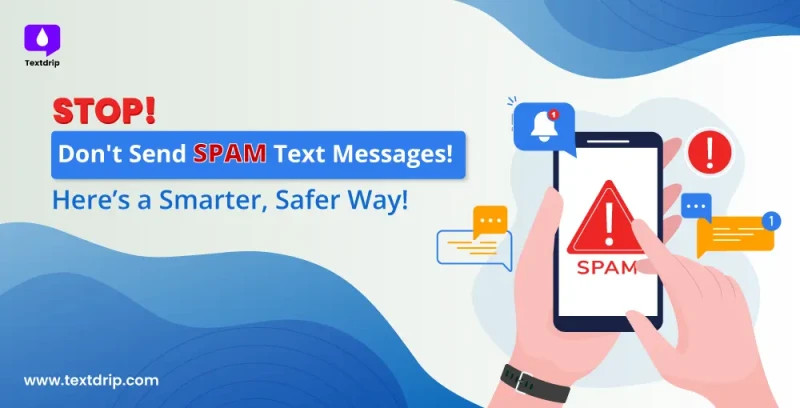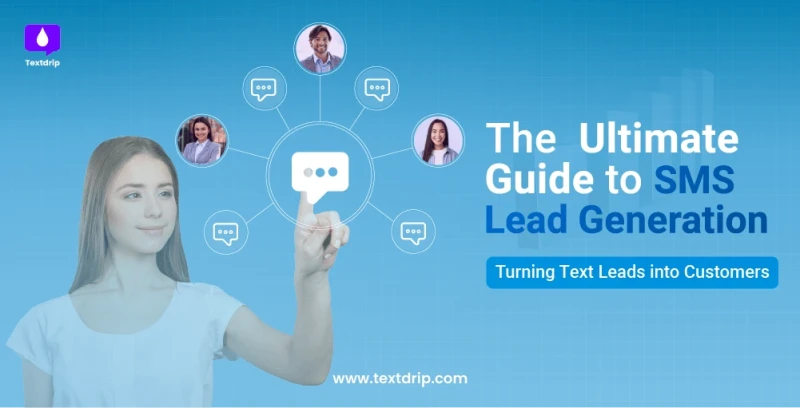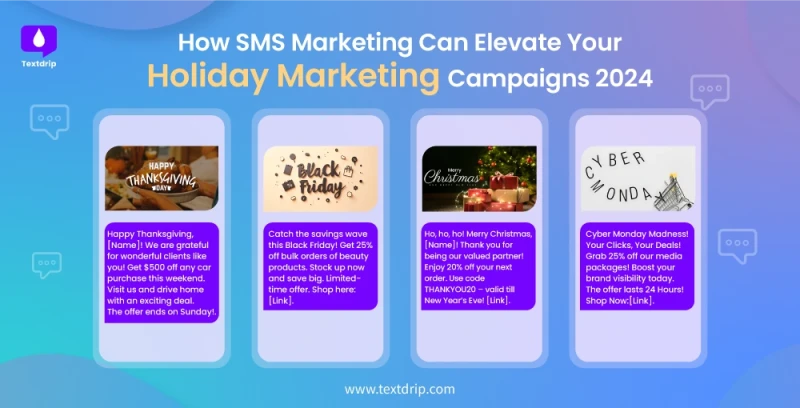
STOP! Don't Send Spam Text Messages! Here’s a Smarter, Safer Way!

18 October 2024

Dhaval Gajjar
"Congratulations! You have won a $1000 cash prize. Claim it here: [Link]." Have you ever received such an unsolicited text message that promises a million-dollar cash prize or a free Amazon gift card/ free cruise? If it sounds familiar, you are not alone! Scammers send spam text messages trying to steal your hard-earned money or access your confidential data like bank account numbers or passwords. Sometimes, scammers use your familiar area codes or pretend to be someone you trust.
Over the past few years, spam text messages, known as smishing, have exploded across the US. As per the study, 59% of Americans receive spam texts. Americans received approximately 19.2 billion spam text messages in September 2024. Even Statista's recent report shows that in March 2023, 45% of US adults encountered spam texts and calls daily. Customers lost around $86 million due to spam messages.
Therefore, you must familiarize yourself with spam text message examples, how to identify them, and ways to avoid legal risks. This blog discusses everything you need to know about spam texting.
What Are Spam Text Messages? How it affects SMS Marketing Campaigns
Spam text messages are irrelevant/unsolicited texts that are meant to be sent to you to reveal your personal/confidential data. These messages are generated via computers and sent to your phone through email or an instant messaging account without the consent of the receivers. Spam texts usually look like they are sent by a trusted organization, a family member, or a business. Spam texts usually include promotional messages of the product/services that the recipient did not opt into and fake offers or deals that look too good to be true.
Here, you need to understand that there is a thin line between spam and scam texts.
Spam text messages refer to the bulk or unsolicited messages that are sent to promote specific products/services. Usually, it is sent without explicitly receiving consent from the receivers. Meanwhile, scam text messages are sent with malicious intent. Scam texts trick recipients into revealing their sensitive information.
If businesses send spam texts, the impact of their SMS marketing for small business campaigns can be ruined. Here, one question will surely pop into your mind – why? The reason is simple. Customers expect and value their privacy. If you try to bombard them with irrelevant and unwanted SMS, it can damage trust. It will lead customers to opt out and even complaints or negative reviews.
In short, spam text messages can be the reason for loss of trust, increased opt-out rates, and legal penalties.
Let’s understand more about spam texts through the context of Phishing, Smishing, and Vishing.
| Phishing | Smishing | Vishing |
| Fraudulent attempts of stealing sensitive information such as credit card information, login details, etc., done by scammers. They pose themselves as the legitimate company through text messages. | It is a type of phishing but specifically uses text messages and trick recipients to get their personal/financial information by encouraging them to click on malicious links or providing data through replies. | Vishing involves voice calls. In it, after sending a text message, fraudsters imitiate a business representative and try to extract information from the recipient verbally. |
Wondering what exactly spam text messages look like? Let's find out in the next section.
Spam Text Message Examples & How to Identify Them
There are endless examples of spam texts. However, here are a few common spam text message examples and red flags that will help you identify them.
1) Hurrah..! You Have Won!
You won the unexpected price. It feels good, but when you receive a text message notifying you that you won the contest, you didn't even participate/enter. It is clearly a phishing text.
Hurrah! You have won the [contest name] & $2000 Amazon Gift Card. Click on [Link] to claim it.
How to spot it?
- You didn't enter the contest for which you got a notification to receive the gift card notification or reward.
2) Bank Verification
Generally, banks never send customers texts that tell them to click on a link to verify their bank account details. If you receive the following text message, it's a clear sign of spam text.
Bank Of America: Your bank account is temporarily suspended. Click here [Link] to reactivate it.
OR
Bank Of America: We have detected an unusual activity in your bank account. Follow this URL to verify your identity [Link].
How to spot it?
- You receive the text from the bank you are not using.
- It is asking for your personal or banking information.
3) SMS from the Government Entities
It is quite uncommon when you receive text from government agencies like the IRS about important information. Generally, scammers send such spam text with the intent to steal money.
Hurry! Last chance to earn extra cash. Your IRS text refund is ready to be accepted. You have only 24 hours remaining. Click here to claim :[Link].
How to spot it?
- Government entities never send such messages.
- The text includes a URL that redirects you to the unrecognized website.
- The message has an unexpected cash refund.
- You are unable to identify the reason, amount, or government entity from which you got a message for the refund.
4) Fake Delivery Notification Text Message
Most people place online orders these days, so deliveries from FedEx and Amazon are common. When you receive a text message from legitimate shippers, they never ask for your personal information or money to complete the delivery. If you receive a text message like the one mentioned below, it's a clear sign of spam texting.
Hey [name], we have a package from [month] pending for you. To claim the ownership and confirm delivery, click here: [Link].
OR
We have a package to deliver to you. Click here [Link] to confirm your delivery address.
How to spot it?
- When you click on the URL, it will redirect you to an unknown website.
- The URL is asking you for some personal information.
- You are getting messages when you have not placed any online order.
5) Unpredicted Job Offer
How will you receive a job offer when you have not applied for any job? Don't click on any link if you are getting any unpredicted job offer texts. They are employment-related spam texts that will provoke you to click on link to learn more about the job offer or provide your contact number to get more details.
Your resume seems impressive. We would love to set up a virtual interview. Click on this [Link] or call us at [phone number] to learn more about it.
How to spot it?
- You received a text from a company where you have never applied for any job.
- The link redirects you to an unauthorized website or page that looks spam.
6) SMS from Your Number
Don't you think receiving a text from your number is so weird? Generally, scammers manipulate phone networks to encourage you to click on something that looks familiar and secure. However, don't fall for it. Usually, scammers send such types of messages to thousands of victims.
Thank you for paying your bill on time. Here is a small gift as a token of appreciation for your loyalty. Click here to claim [Link].
How to spot it?
- You have received a text from your number.
- The SMS includes a link to click to receive your reward.
7) Loved Ones Need Financial Help
It is among the most common spam text messages people usually receive. The message makes you think your loved one is in trouble and needs urgent financial help. The message creates a sense of urgency and prompts you to respond quickly without verifying sender's identity.
Your mother met with an accident and requires immediate medical attention. Kindly wire money ASAP to [account detail].
How to spot it?
- The sender is asking for payment through unconventional methods like gift cards.
- The message has a threatening tone.
- The sender is asking you to follow a specific link to contact them.
8) SMS from Your Boss
Spoofing of text messages that look like it is straight from your boos is another type of spam text. The message usually involves a work emergency or a request that you send them money.
Hello, [Boss Name], this side. I am in a meeting and need an urgent favour from you. Can you please transfer $1000 to this bank account [bank account number]? Please don't call; I will explain everything later. Till then, keep this matter confidential.
How to spot it?
- You or your boss never contact each other via text message.
- The sender is insisting that you do not call.
- The sender used your full name present as it is on LinkedIn or any other website.
Some other common signs of spam text messages are:
- The message is not relevant to you.
- It has poor grammar and spelling mistakes
- The text lacks personalization.
- You received a message from an unknown number.
- The message contains a suspicious link.
- The sender is asking you to reveal your identity, personal information, or confidential data.
- There is no information on how to opt-out.
- You have not given consent to the sender to send you a message.
Best Practices to Avoid Sending Spam Text Messages to Your Audience
Do you want to ensure that your text message does not appear as spam? If so, you need to follow the best practices below.
Before sending a message to any customer, ensure you take explicit consent from them. The opt-out process should be straightforward. You can use phrases like "Reply STOP to unsubscribe" in a message.
Make the message personalized by including your customer's name. It will differentiate your message from spam texts. Don't bombard your customers with frequent messages; otherwise, they will perceive you as a spammer. Decide the frequency by respecting your customers' time, such as sending one or two text messages per week and sticking to the schedule.
Make sure you always include your brand's name in the message. It will help recipients identify who is sending them messages.
How can spam text messages be avoided?
If you don't want to send spam text messages to your customers, you need to follow legal guidelines and craft your SMS marketing campaign's strategy around compliance. Here are a few ways you can avoid spam text messages.
You can use an automated SMS marketing platform like Textdrip, which has a built-in compliance tool. Therefore, it ensures that the messages you send are legal. The platform also helps maintain the opt-in and opt-out process effectively so that you can easily manage your subscribers.
Do not send the same message to everyone. Instead, use the STP marketing approach and segment your audience based on their preferences, gender, behaviour, demographics, etc., so your messages won't be seen as spam.
Maintain an accurate record of the number of opt-ins and opt-outs. This record can be beneficial when dealing with complaints or legal inquiries. Besides, regularly review your content, frequency of SMSs, etc. Such an internal audit can help you determine loopholes where your message may look spammy.
What should be done if a spam text message is unintentionally sent?
It is OK to make mistakes. Mistakes happen, but how you respond to them makes the BIG difference. If you realize you have sent a spam text message unintentionally, apologize quickly.
How?
Send a follow-up message to your customers explaining that you mistakenly sent it. It will help you regain trust. You can even offer special discounts/offers as a goodwill gesture. It will make your customers realize that you value their subscription.
Invite all your recipients to confirm their opt-in status. Learn from your mistakes, review what went wrong, and update your practices so you won't repeat such mistakes. Also, give your subscribers a way to opt-out if they don’t want to receive messages from your business in the future. This way you can maintain your brand’s goodwill and comply with regulations.
Stop or pause the automated SMS campaign immediately if you realize spam messages were being sent by mistake. Another most imperative thing you can do is analyze the campaign’s content, recipient’s list properly so you get an idea of what went wrong. Also, check for any technical glitch/issue present in the SMS marketing platform.
Review the process properly and try to find out the cause behind it so you won’t repeat the same mistakes again in the future. This process involves managing subscriber list, double checking the content before sending them, and thoroughly executing the process before hitting the SEND button.
Whatever feedback you receive from your subscribers, address them properly. Even if you receive any negative feedback, address them politely and professionally.
Are there any penalties for sending spam text messages?
Yes, if you send spam text messages, you need to deal with legal penalties depending on jurisdiction and laws. According to TCPA in the US, you have to pay up to $1,500 per violation if you send spam text messages without consent. If you repeatedly violate the rules and regulations of SMS marketing, you need to deal with legal actions that can cost you millions, as such cases often end in settlement.
Another major penalty you will face is carrier blocking. If mobile carriers find out that your messages are spammy, there is a high chance that they will block your number, so you won't be able to run any future SMS campaigns.
Besides all these, the major setback that you will face is reputation damage. Customers who receive unwanted messages again and again won't trust your business in the future.
What Regulations Are Relevant to SMS Marketing?
SMS marketing regulations protect customers from spam texts and offer a fair opportunity to businesses for marketing. Here are a few key regulations you must know as a business owner.
1) TCPA
TCPA is a US regulation for SMS marketing that requires brands to get explicit consent from customers before sending them any promotional texts. It also ensures that each SMS includes clear opt-out instructions. Violating this rule can result in fines, legal actions, or lawsuits.
2) 10DLC
As per this rule, businesses must use 10DLC-registered numbers for promoting their product or services. If mobile carriers identify unregistered numbers, they can block their numbers.
3) CTIA
Businesses must follow CTIA – Cellular Telecommunication Industry Association guidelines for SMS marketing in the US. However, there is no legal binding in it, but if you follow CTIA best practices, you can reduce the risk of your message being identified as spam.
Avoid Sending Spam Text Messages Using Textdrip
These days, people are aware of spam text messages and can easily identify them. However, as a business owner, you must take some extra steps so that your SMS marketing campaigns look professional and genuine before your potential customers delete or block your number.
Textdrip is an easy-to-use SMS marketing platform. It helps you craft creative SMS campaigns that build trust and authenticity rather than getting marked as spam SMS. With simple-to-setup SMS solutions and features like DNC check with landline remover, Textdrip enables you to appear legitimate in front of your potential customers' eyes. So, what are you waiting for? Start your free trial today!
FAQ's
| How can I protect my brand from being associated with spam text messages? |
Always use verified messaging platforms, stick to TCPA & 10 DLC, and track opt-out rates.
| What tools can help prevent sending spam text messages? |
Use an SMS platform with compliance built in that monitors the content of the message and handles opt-in management and tracks opt-outs.
| Are there penalties for businesses that send spam text messages? |
Yes, businesses can face fines up to $1,500 per violation under the TCPA for sending unauthorized text messages.
| What should I do if customers report my messages as spam? |
Immediately review your messaging practices, remove non-compliant numbers from your list, and refine your opt-in process to prevent further issues.
Explore more content
More Sales Opportunities?
Automate your text messaging hustle to generate more sales opportunities with Textdrip and watch your business grow.











